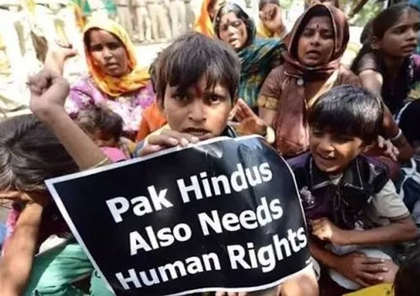UN, rights group slam Pakistan for ongoing persecution of religious minorities
By IANS | Updated: July 28, 2025 17:14 IST2025-07-28T17:07:25+5:302025-07-28T17:14:45+5:30
Islamabad, July 28 Shocked at reports of increasing violence against vulnerable communities on grounds of their religion or ...

UN, rights group slam Pakistan for ongoing persecution of religious minorities
Islamabad, July 28 Shocked at reports of increasing violence against vulnerable communities on grounds of their religion or belief in Pakistan, a panel of United Nations (UN) human rights experts has called for immediate investigations, prosecutions, and reforms to protect the country's religious minorities.
Only last week, the UN human rights experts issued an unusually sharp rebuke to Pakistan, expressing that they were "shocked at reports of increasing violence against vulnerable communities on grounds of their religion or belief". Their statement, published on July 24, carried the weight of decades of frustration, a 'One World Outlook' report cited.
"Pakistan must break the pattern of impunity that has allowed perpetrators to act without restraint," the UN panel urged, calling for immediate investigations, prosecutions, and reforms to protect the country's religious minorities.
The minorities in Pakistan - including Ahmadiyya Muslims, Christians, Hindus, and Shia Muslims - continue to be neglected and increasingly subjected to targetted state-backed persecution.
The latest reports from Amnesty International and New York-based rights group Human Rights Watch have also highlighted the "systemic repression" and called the violence stemming from blasphemy allegations in 2025 "intensified terror against communities who have nowhere to turn".
According to the report, the ongoing violence against minorities is deliberate rather than "sporadic or random". The recent UN report held Pakistan responsible for "tacit official complicity", arguing that law enforcement's failure to act has emboldened extremists.
Raising concern, the UN experts stated, "The cycle of fear prevents both people and institutions from upholding the rights and dignity of these minorities".
Pakistan's Ahmadiyya community, the report highlighted, continues to face severe persecution, having been constitutionally declared non-Muslim in 1974.
They are prohibited by law from identifying themselves as Muslims, practicing their faith publicly, or referring to their places of worship as mosques.
Human Rights Watch documented multiple incidents of violence against Ahmadiyya in 2024, involving desecration of their mosques, vandalism of their cemeteries, and burning of their religious texts. "Even in death, they are denied dignity as graveyards are routinely vandalised," the report stated.
Pakistani authorities place Ahmadiyya voters on separate electoral rolls, their religious sites are frequently sealed by police, and they are often charged with "fabricated" blasphemy cases leading to detentions, disappearances, and escalating extrajudicial killings.
The US Commission on International Religious Freedom (USCIRF) also described the blasphemy laws as "a mechanism of ethnic cleansing", and has repeatedly suggested designating Pakistan a "country of particular concern".
According to the 2025 report of the Commission, "religious minority communities — particularly Christians, Hindus, and Shia and Ahmadiyya Muslims — continued to bear the brunt of prosecutions under Pakistan’s strict blasphemy law".
Human Rights Watch and Amnesty International have recorded several cases of sexual violence against women who were detained under fabricated blasphemy charges by Pakistani authorities.
On the other hand, forced conversions and marriages remain a persistent crisis with Hindu, Christian, and Sikh girls — some as young as 12 — being abducted, forcibly converted to Islam, and married off to their abductors.
Earlier this year, during a UK Parliamentary debate, lawmakers criticised these practices as a "serious abuse of human rights that robs women and girls of the right to choose their own future".
The UN, in its July 2025 statement, also called on Pakistan to abolish blasphemy laws, hold perpetrators accountable, and ensure the protection of religious sites.
Disclaimer: This post has been auto-published from an agency feed without any modifications to the text and has not been reviewed by an editor
Open in app